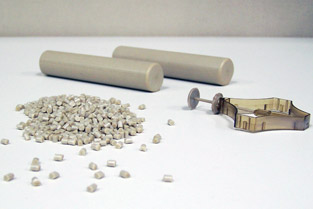
Polymers for Surgical Implant Applications
Raw materials used for polyetherketoneketone polymer surgical implants.
Many types of surgical implants and other medical devices are made of polymeric materials. A new ASTM standard covers the raw material properties for a high strength polymer used for surgical implants.
F2820, Specification for Polyetherketoneketone (PEKK) Polymers for Surgical Implant Applications, has been developed by ASTM International Subcommittee F04.11 on Polymeric Materials, part of Committee F04 on Medical and Surgical Devices.
According to Jon Mosely, Ph.D., director of implant technology, Wright Medical Technology Inc., F2820 will facilitate regulatory approval for new devices. Material requirements set forth in the standard are based on the properties of resins that have been proven to be biocompatible and have been used in successful long-term implantable devices.
F2820 specifies allowable ranges for composition, mechanical attributes and physical properties as well as acceptable quality control practices for PEKK polymers used in the manufacture of medical devices. Each of the factors covered by the standard is important in assuring that the materials used will perform as expected.
"This is of particular importance in permanent implant applications, where failure can lead to additional surgical procedures and potentially harm the patient," says Moseley, who is chairman of F04.11. "In addition, using materials that meet the requirements of F2820 can reduce or eliminate the need for animal testing for these materials."
F2820 will be used by resin manufacturers for quality control and as a guide for developing master files, compilations of test data for use by device developers and regulatory agencies. The standard will be useful in the approval process for new devices because both developers and agencies recognize the value of using standardized materials to help ensure the safety and efficacy of medical devices.
Interested parties are welcome to participate in the standards developing activities of F04.11. In addition to the task group that developed F2820, other task groups are working on acrylics (for example, bone cement), absorbable polymers and ultra-high molecular weight polyethylene. The subcommittee is particularly interested in participation from surgeons as they are in the best position to provide feedback on the performance of devices fabricated from polymeric materials.
To purchase ASTM standards, visit www.astm.org and search by the standard designation, or contact ASTM Sales (phone: 877-909-ASTM; sales@astm.org).
CONTACT Technical Information: Jon P. Moseley, Ph.D., Wright Medical Technology Inc. • Arlington, Tenn. • Phone: 901-867-4414 | ASTM Staff: Pat Picariello • Phone: 610-832-9720 | Upcoming Meeting: May 21-24 • May Committee Week • Indianapolis, Ind.
 SN Home
SN Home Archive
Archive Advertisers
Advertisers Masthead
Masthead RateCard
RateCard Subscribe
Subscribe Email Editor
Email Editor